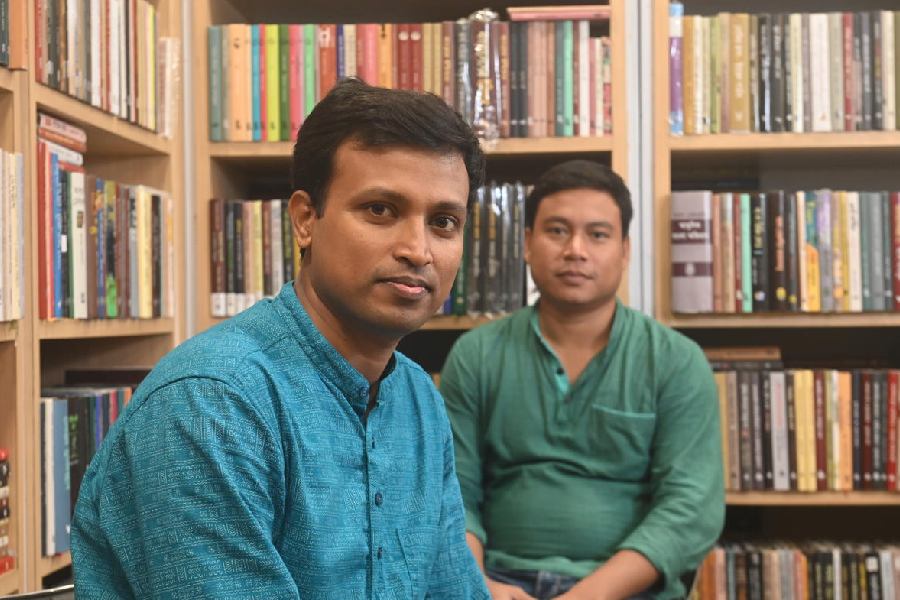Palash Mandal and Pradeep Roy run a quiet bookstore near the College Street crossing that only sells books from Bangladesh. It is quiet but cheerful and very welcoming, somewhat like the two young men in charge of it.
Called Kathaprakash, it is located on Shyama Charan De Street. The store is one of the very few places in the city selling books only from Bangladesh.
The bookstore is also quite colourful. You see rows of Harishankar Jaladas, a bestselling writer from Bangladesh, as well as a small section entirely for children’s books. A miniature hardbound book reveals hilarious little love poems. A bright large poster shows experimentation by Sabyasachi Hazra with Bengali typography. Hazra is known for his arresting book covers. A lot is going on.
But Mandal and Roy, both 34, and from West Bengal, have never been to Bangladesh. “Not yet,” smiles Mandal. The shop keeps them busy.
Kathaprakash is a small bookstore on the ground floor of a building. Unlike in many of the older College Street bookstores, where a stout counter separates the book-buyer from the bookshelves, here you have direct access to the shelves.
Away from the bustle of College Street, the store has an unhurried, peaceful air. The visitor is greeted gently and made to feel at home, and however demanding her query is, it is entertained.
Many books published in Bangladesh are by authors from West Bengal. “Here research-based books are more in demand,” says Mandal. Many researchers are based in Bengal, such as Barendu Mandal, who has written for little magazines.
The Kathaprakash store represents — and facilitates — a conversation between Bangladesh and Bengal that has continued, always, through a common language and a shared literature and culture.
Currently, both places are in a state of upheaval, but the books continue to come in from Bangladesh and so do writers and publishers, even as readers from the city keep trickling in at the store. Mandal and Roy are there from early afternoon to late evening.
The store was set up in 2023. Previously, a Kathaprakash bookstore close to the new store sold only books published from Kathaprakash, a Dhaka publishing firm. “But we would get requests from books from other Bangladesh publishers. That’s when the management in Dhaka decided to open this store,” says Mandal.
Mandal and Roy have done their master’s in Bengali, from Calcutta University and Jadavpur University, respectively. Both wanted to be schoolteachers. When that did not happen, they came into publishing.
Now they do not regret it.
Mandal grew up in Gosaba in the Sunderbans, reading books voraciously, and Roy in Cooch Behar in north Bengal, doing the same. For them, being surrounded by books all day has its reward.
But books from Bangladesh add to it. They are both familiar — and unfamiliar. Mandal repeatedly talks about the diversity of books from Bangladesh. Mandal is not exactly a loquacious person, but Roy speaks even less.
The bookstore leads to special encounters. “Harishankar Jaladas came here,” says Mandal.
Jaladas has had a remarkable career. He was born into a fisherman’s family in Chattagram. With immense grit, he pursued his education and wrote his doctoral thesis on river-based Bengali novels and fishermen’s lines. He was appointed the principal of a college.
“But the discrimination that he faced because of his ‘low birth’ never stopped,” says Mandal. He was 50 when he began to write. Some of his books are based on the Puranas and others about his experience of belonging to a marginalised community. His works might remind one of Titas Ekti Nadir Naam by Advaita Mallabarman, agrees Mandal. “Harishankar Jaladas spoke about his life to us,” he says.
Many other writers drop in, too, says Mandal, “but sometimes we don’t know them!”
He holds up a book enthusiastically. It is called Thangliana. It is a translation from the original English book titled A Fly on the Wheel by Thomas Herbert Lewin, a British administrator in the hilly areas of Chattogram between 1865 and 1872. He was addressed as Thangliana by local people.
“There’s a great variety in books from Bangladesh,” says Mandal. The volume of writing that comes from Bangladesh is also considerable, though, of course, the quality may vary, say both Mandal and Roy.
“So many people write there, from so many professions,” says Mandal. Bestsellers abound. Humayun Ahmed is still going strong, with rows of his books on display, but Sadat Hossain is an upcoming name to reckon with, says Mandal.
The enterprise is undeniable. “Bangladeshis have organised Bengali book fairs in New York and Dubai,” he adds. He points at the children’s books at the store. “They are published by Ikri Mikri, who are devoted entirely to bringing out children’s books,” he says.
At the same time, says Mandal, readers from Bangladesh are more interested in books from here than the interest readers here show in books from Bangladesh.
Which books do they prefer?
Mandal looks a little embarrassed. A resident of Keshtopur, he often picks up a book from the store to read on the bus, on his way to the store and back. “But it doesn’t happen. So my favourites remain the classics I read as a student, Rabindra-Bankim, Tarashankar-Manik.”
Roy agrees. He loves the classics still. He mentions Akhtarujjaman Ilias, Shaukat Ali and Amiyabhushan Majumdar, who was from Cooch Behar.
“I am interested in the art and culture of north Bengal. When I am home, I wander about,” he says.
Mandal says he will start reading once more. “Once I start, there will be no looking back.”
The other thing on their agenda is going to Bangladesh.










